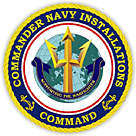3rd Naval District
| Commander, Navy Installations Command Navy Installations Command |
|
|---|---|

CNIC Seal
|
|
| Active | October 1 - 2013 - present |
| Country |
|
| Branch |
|
| Type | Enterprise Command |
| Role | Manages, operates, controls and supports naval installations and activities |
| Headquarters | Washington Navy Yard, Washington, DC |
| Nickname(s) | CNIC (Scenic) |
| Motto(s) | "Sustaining the fleet, enabling the fighter, supporting the family" |
| Commanders | |
| Commander |
VADM Dixon Smith |
| Reserve Commander |
RDML Brian LaRoche |
| Deputy Commander |
Mr. Joseph Ludovici, SES |
| Force Master Chief |
FORCM Andrew D Thompson |
Navy Installations Command (CNIC) is an Echelon II shore command responsible for all shore installations under the control of the United States Navy. As an Echelon II command, it reports directly to the Chief of Naval Operations. It is responsible for the operation and management of all Naval installations worldwide through eleven Navy Regions.
Prior to the creation of CNIC, all of the Navy's major shore echelon II commanders (BUMED, NAVSEA, NAVSUP) operated their own installations independent of each other. This led to a hodgepodge of installation operating procedures, that, when installations operated in close proximity to one another, resulted in sometimes incompatible and large policy differences. Thus, it was the intent of CNIC is to establish a single shore installation management organization that will focus on installation effectiveness and improve the shore installation management community's ability to support the fleet. When it was established October 1, 2003, the stand up of CNIC was an effort in the continuation of fleet and regional shore installation management organizational alignment that began in 1997 with the reduction of installation management claimants from 18 to 8.
CNIC has overall responsibility and authority as the for all installation support programs and is the lead within Navy for installation policy and program execution oversight. CNIC works to coordinate services and across the Naval Enterprises (aka shore Echelon II commands), and best provide the installations, services and programs in their support. These services include installation management and operations, such as port operations, airfields, security, utilities, land use planning, environmental aspects, planning and real estate, and emergency management, as well as fleet support services such as base housing, weapons storage, MWR recreational programs, child care and youth programs.
Its mission is summed up as supporting the three 'F's: "Fleet, Fighter and Family."
Historically, each region was a part of a Naval district from their inception in the early 1900s until their disestablishment in the late 1970s and 1980s. At that point, individual installations were typically operated independent of any true centralized command structure. In 1998, the Navy embarked on a new era in shore management, with San Diego leading the way. As the Navy reduced its operational forces, it became essential for the shore establishment supporting those forces to be realigned.
...
Wikipedia
